

Mount Sinai School of Medicine - Social Media Guidelines. Introduction Social media are internet-based applications which support and promote the exchange of user-developed content.

Some current examples include Facebook, Wikipedia, and YouTube. Posting personal images, experiences and information on these kinds of public sites poses a set of unique challenges for all members of the Mount Sinai community, including employees, faculty, housestaff, fellows, volunteers and students (collectively “Personnel”). All personnel have responsibility to the institution regardless of where or when they post something that may reflect poorly on Mount Sinai. Washington University School of Medicine in St. Louis. Addendum to the Washington University in St.
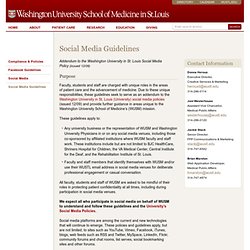
Louis Social Media Policy (issued 12/09) Purpose Faculty, students and staff are charged with unique roles in the areas of patient care and the advancement of medicine. Due to these unique responsibilities, these guidelines seek to serve as an addendum to the Washington University in St. Health Questions and Answers - Healthysparx.
HOW TO: Get the Most Out of Google Reader. The real-time web is becoming an increasingly important source of news, but many users still prefer to receive their content the old-fashioned way: Through a steady diet of RSS feeds.
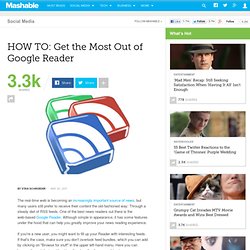
One of the best news readers out there is the web-based Google Reader. Although simple in appearance, it has some features under the hood that can help you greatly improve your news reading experience. If you're a new user, you might want to fill up your Reader with interesting feeds. If that's the case, make sure you don't overlook feed bundles, which you can add by clicking on "Browse for stuff" in the upper left-hand menu.
Here you can browse through featured feed bundles, bundles from your friends or recommended feeds from users with similar interests as you. Once you've populated the Reader with enough feeds that interest you, it's time to start organizing them. Folders The simplest ways to organize feeds is by creating folders. Trends. Social Networking Savvy - April 2011. Back to Table of Contents | April 2011.
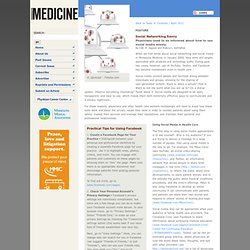
Who Should Manage Your Social Media Strategy [Accepted for publication in The Physician Executive] By Kent Bottles, M.D., and Tom Sherlock Hospital and medical group leaders are facing the most challenging healthcare environment in recent memory.
![Who Should Manage Your Social Media Strategy [Accepted for publication in The Physician Executive]](http://cdn.pearltrees.com/s/pic/th/publication-physician-10203607)
The need to decrease per-capita cost and increase quality to respond to federal healthcare reform and the global economy is a daunting task that requires two-way communication with a broad range of stakeholders. Wikipedia: A Key Tool for Global Public Health Promotion. Facebook 110: Protecting Privacy in Facebook. Is Your Facebook Account a Privacy Breach? A recent article in the Journal of Medical Ethics (there is a link to the paper at the bottom of the article) reviewed doctors’ current Facebook use and what this might imply in terms of the doctor/patient relationship.
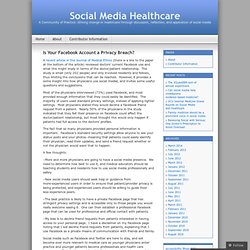
The study is small (only 202 people) and only involved residents and fellows, thus limiting the conclusions that can be reached. However, it provides a some insight into how physicians use social medial, and invites some useful questions and suggestions. Most of the physicians interviewed (73%) used Facebook, and most provided enough information that they could easily be identified. The majority of users used standard privacy settings, instead of applying tighter settings. Most physicians stated they would decline a Facebook friend request from a patient. The fact that so many physicians provided personal information is important. Social Media and the Medical Profession. A guide to online professionalism for medical practitioners and medical students A joint initiative of the Australian Medical Association Council of Doctors-in-Training, the New Zealand Medical Association Doctors-in-Training Council, the New Zealand Medical Students’ Association and the Australian Medical Students’ Association.
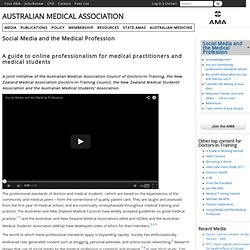
The professional standards of doctors and medical students – which are based on the expectations of the community and medical peers – form the cornerstone of quality patient care. CasesBlog: Why you should start blogging in 2011. Quotes from an interview with Seth Godin and Tom Peters: "Blogging is free.
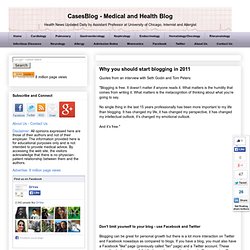
It doesn’t matter if anyone reads it. What matters is the humility that comes from writing it. CasesBlog: For doctors: How to be a Twitter star in two easy steps. Careers - Twitter going global. Authors: Fiona Pathiraja, Annabel Bentley Publication date: 05 Jan 2011 Fiona Pathiraja (@dr_fiona) and Annabel Bentley (@doctorblogs) explain why Twitter is increasingly relevant to doctors and discuss how to use it as a professional networking tool When the BMJ first covered Twitter in June 2009, it was seen as Facebook’s lesser sibling, a niche micro-blogging service. [1] Since then, its popularity has skyrocketed, and now many doctors, researchers, and healthcare leaders are regular users. In this article we discuss how to use Twitter as a powerful professional networking tool. Twitter provides doctors with access to a vast global professional network of commissioners, providers, journals, patients, clinicians, and many others.
By choosing whom they follow, users set their own filters for information. As well as being a source of information and ideas, Twitter helps doctors to raise their profiles and build powerful networks. Medicine in Social Media. HLWIKI Canada.